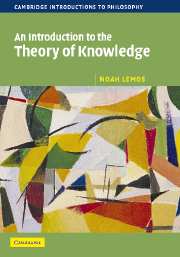Book contents
- Frontmatter
- Contents
- Preface
- 1 Knowledge, truth, and justification
- 2 The traditional analysis and the Gettier problem
- 3 Foundationalism
- 4 The coherence theory of justification
- 5 Reliabilism and virtue epistemology
- 6 Internalism, externalism, and epistemic circularity
- 7 Skepticism
- 8 The problem of the criterion
- 9 The a priori
- 10 Naturalized epistemology
- Select bibliography
- Index
8 - The problem of the criterion
- Frontmatter
- Contents
- Preface
- 1 Knowledge, truth, and justification
- 2 The traditional analysis and the Gettier problem
- 3 Foundationalism
- 4 The coherence theory of justification
- 5 Reliabilism and virtue epistemology
- 6 Internalism, externalism, and epistemic circularity
- 7 Skepticism
- 8 The problem of the criterion
- 9 The a priori
- 10 Naturalized epistemology
- Select bibliography
- Index
Summary
In examining theories about what makes beliefs justified or instances of knowledge and in considering various responses to skepticism, we have assumed that we can pick out instances of justified belief and knowledge. We have rejected various philosophical claims about knowledge and justification because they were incompatible with what we take ourselves to know or be justified in believing. For example, when we considered in the last chapter the view that knowledge required certainty, we argued that since we do know things that aren't certain, knowledge does not require certainty. We rejected a view about what knowledge required because it conflicted with what we took ourselves to know. Similarly, we have assumed in various chapters that children and animals have knowledge, and therefore certain theories of knowledge are mistaken. To some it may seem that this is the wrong way to approach the problems of epistemology. To others this seems like a reasonable approach. In this chapter we shall consider one way of defending this approach to the problems of epistemology and we shall consider a variety of objections to it.
Chisholm and the problem of the criterion
In The Problem of the Criterion, Roderick Chisholm identifies two main questions in the theory of knowledge:
A What do we know? What is the extent of our knowledge?
B How are we to decide whether we know? What are the criteria of knowledge?
Chisholm distinguishes between three general approaches to these questions: skepticism, methodism, and particularism. Let us consider briefly what he says about each.
Information
- Type
- Chapter
- Information
- An Introduction to the Theory of Knowledge , pp. 158 - 178Publisher: Cambridge University PressPrint publication year: 2007
